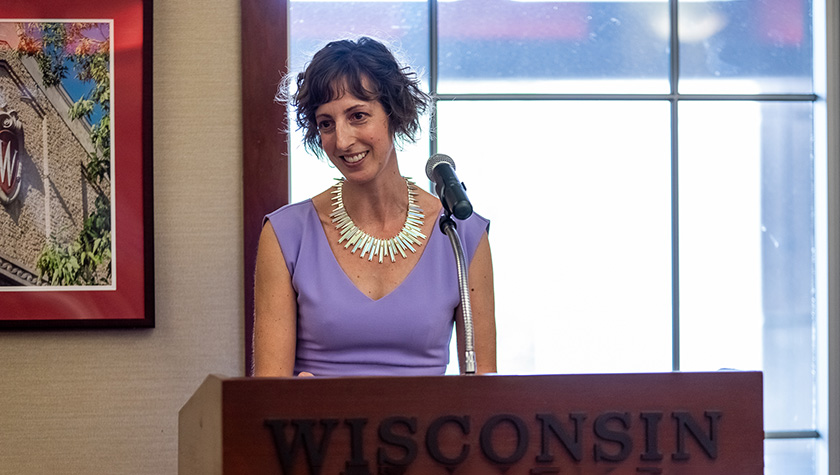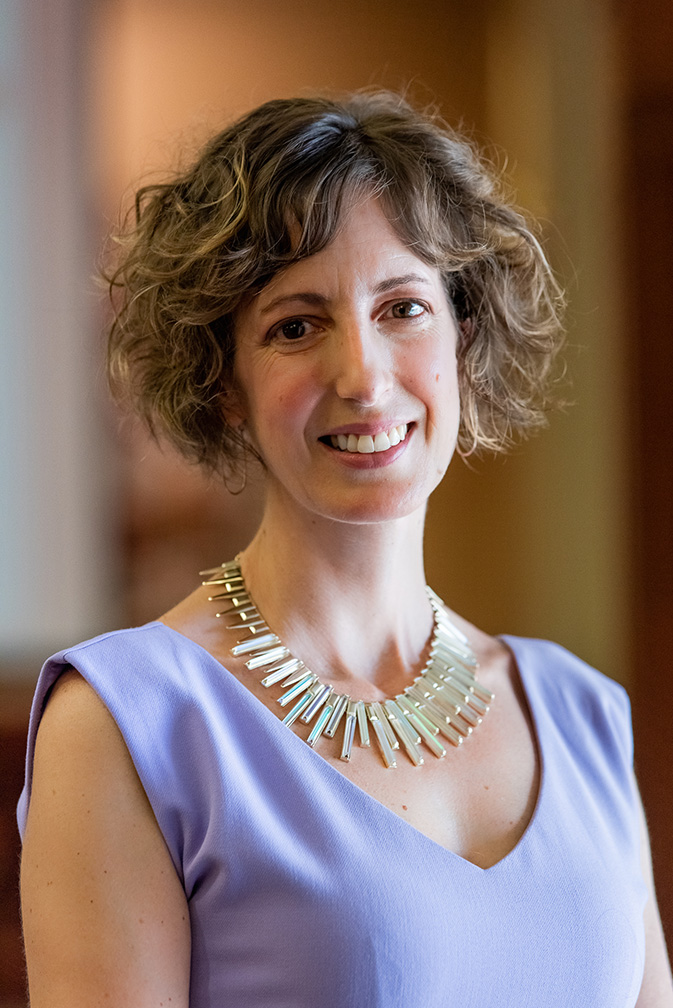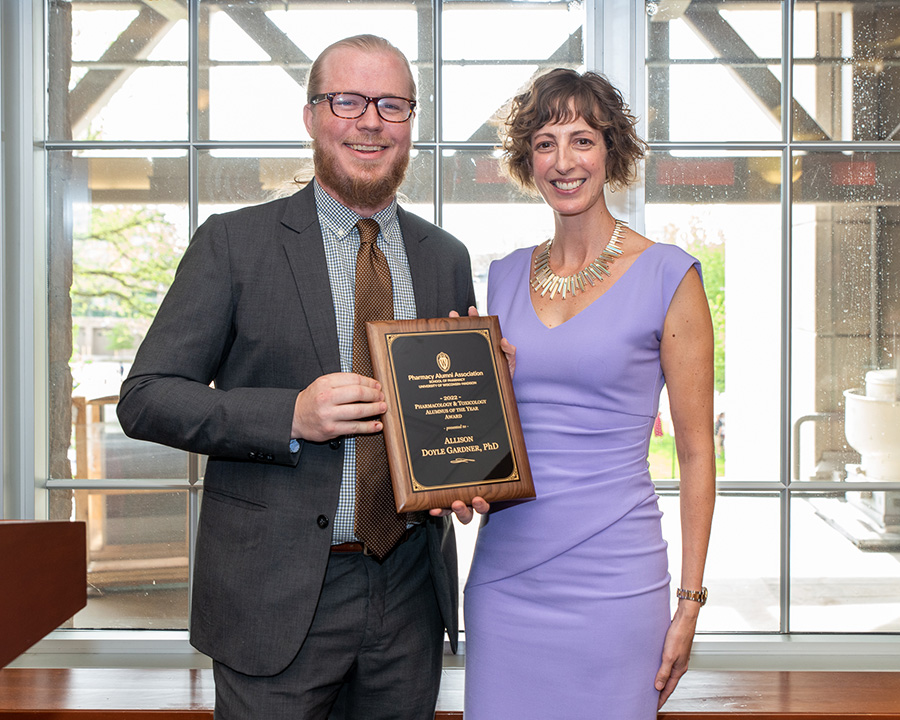
The Pharmacy Alumni Association honors Gardner’s contributions to continuing professional development for healthcare professionals
By Katie Ginder-Vogel
When student physicians, pharmacists, and other health providers earn their degrees and license to practice, their education is far from over. As new therapeutics and diagnostics are developed, more is learned about disease states, and the delivery of healthcare evolves, providers must stay up-to-date. That’s where the work of Allison Gardner (BS ’99) comes in.
Gardner is the senior vice president of educational strategy and content at Med-IQ, which provides continuing education to doctors, nurses, and pharmacists on clinical and risk management, patient safety, and quality improvement, and educates the general public on various medical topics.
Her team has produced educational materials in numerous therapeutic areas like oncology, mental health, endocrinology, and neurology, leaving a mark on the care of innumerable patients and their families. For her contributions to continuing professional development for healthcare professionals, the University of Wisconsin–Madison School of Pharmacy’s Pharmacy Alumni Association (PAA) is honoring Gardner as the 2022 Pharmacology and Toxicology Alum of the Year.
“I can think of no better example of the Wisconsin Idea than consistently delivering ever higher quality educational programs that keep our doctors, pharmacists, and nurses up to date on the latest clinical science that impacts patients in all corners of Wisconsin and across the globe.”
—Kyle Kleinbeck
“Allison Gardner was selected based on a transformational track record of success in building Med-IQ into one of the most awarded and published continuing medical education providers in the country,” says Kyle Kleinbeck (BS ’07, PhD ’11), who sits on the PAA Board of Directors. “I can think of no better example of the Wisconsin Idea than consistently delivering ever higher quality educational programs that keep our doctors, pharmacists, and nurses up to date on the latest clinical science that impacts patients in all corners of Wisconsin and across the globe.”
A love for PharmTox
Gardner knew while she was still in high school that she wanted a career in science. She was taking advanced chemistry and biology courses and was searching for the right undergraduate program to cultivate her interests when she read about the PharmTox bachelor’s degree program at the UW–Madison School of Pharmacy.
“It was so different than anything else that I had read about,” recalls Gardner. “I felt like it was the perfect combination of biology and chemistry, thinking about how drugs work and interact in our bodies.”

She enrolled at UW–Madison with the PharmTox program as her goal, and in her second semester she started an independent study in the lab of now-emeritus Professor Bill Mellon at the School of Pharmacy.
“That gave me more dimension as to what working in the field of science could be like, being at the bench,” says Gardner.
She continued her research in Mellon’s lab throughout her undergraduate years studying vitamin D3-induced signal transduction in cultured cells, and earned a Pfizer Undergraduate Research Fellowship, which culminated in a poster session at Pfizer Headquarters.
“That was another great experience, to see what it’s like to come together and talk about research, put a poster together, and answer questions,” Gardner says. “It was a prelude to graduate school.”
Gardner was admitted into the PharmTox program as a junior and joined a cohort of 10 other undergraduate students, taking a broad swath of courses covering drug delivery and metabolism, oncology, public health, endocrinology, and more.
“To be in such a small department in a huge university was the best of both worlds,” she says. “I had all the resources of a big university but in a program that offered lots of support, attention, and opportunities.”
In her coursework and independent study work in the Mellon Lab, Gardner found herself fascinated by how messages are communicated between and within the body’s cells.
“That was the thread that carried me through into graduate school,” Gardner says. “On a very small scale, how do these messages get communicated, and how do cells respond?”
“[The PharmTox program] felt like it was the perfect combination of biology and chemistry, thinking about how drugs work and interact in our bodies.”
—Allison Gardner
After graduation, Gardner returned to the Chicago area, where she grew up, to work as a quality assurance lab technician in the diagnostics division of Abbott Laboratories to get industry experience before pursuing graduate school. When Gardner felt she was prepared to return to school, she chose the Johns Hopkins University School of Public Health in Baltimore to study calcium signaling dynamics in mammalian eggs, earning her PhD in biochemistry and molecular biology.
“It was a really cool place to do research. In addition to attending seminars on cutting edge basic science, we’d also go to talks hosted by the epidemiology or international health departments,” she says. “That gave me a wider lens on what I was doing. The first SARS outbreak happened while I was a student there; there was always energy and buzz.”
Medical education
After earning her PhD, she went to work for Innovia, a continuing medical education company in Baltimore that needed scientists with advanced degrees to work with physicians and develop continuing education courses.
“I didn’t even know it was a field, but it was right up my alley,” says Gardner. “I’d get to think about research, science, and drugs — how they work and their side effects — all wrapped up together, while working with people, and it was really fantastic.”
Gardner spent two years at Innovia before moving back to the Midwest to be an adjunct faculty member at Columbia College in Chicago, teaching human reproduction. After a year, a friend from Innovia who had moved to Baltimore-based Med-IQ encouraged Gardner to interview with the company. Gardner was their first remote employee.

“I’ve gone through an evolution,” she says. “I started out creating content, working with thought leaders to create courses about a variety of disease areas. My undergraduate education really helped, because I can understand things at the molecular level. I’d work on lung cancer in the morning, then multiple sclerosis, then diabetes. I could jump around and work on different therapeutic areas, and it was super interesting.”
Gardner advanced through the company, first joining as a clinical content manager and soon ascending to a director-level job before landing where she is today: senior vice president of educational strategy and content.
“In 2016, Med-IQ’s founders were looking to sell to a larger organization, so I got involved in presentations to potential buyers, and my role became business strategy,” Gardner says. “Now, I oversee all of our education and consulting work.”
That year, Med-IQ merged with several entities and is owned by Coverys, a large medical professional liability insurance company based in Boston, although it operates as its own subsidiary of about 80 employees. Today, Med-IQ provides cutting-edge clinical and risk management education to over 275,000 healthcare professionals across the country each year.
In addition to educating healthcare professionals, Med-IQ began to tap into the reach and power of social media to bring important health-related information to the general public, including when COVID-19 hit. They leveraged social media platforms like Facebook and Instagram to provide COVID-19 education, including on vaccines.
“I have been successful in this role because the foundations I built at Wisconsin and in graduate school gave me a deep understanding of how systems work and how drugs work. Without knowing this job existed, I was preparing for it.”
—Allison Gardner
“We had some amazing outcomes from that series,” says Gardner, including a colleague who decided to get vaccinated after watching an informational session about the COVID-19 vaccines. “When you hear stories that show what you do day-to-day really matters, it’s such a profound feeling. I love it.”
Gardner says UW–Madison prepared her for her career success.
“I have been successful in this role because the foundations I built at Wisconsin and in graduate school gave me a deep understanding of how systems work and how drugs work,” she says. “Without knowing this job existed, I was preparing for it.”
She advises students not to worry if they feel like all they know is what they don’t want to do for work.
“In college, I’d get worried that the only thing I was figuring out is what I didn’t want to do,” she says. “If people are worrying like I did, it’s all good. The world is changing, technology is changing. Your career might not even exist yet, or you might not even know about it. It’s a really exciting time.”
Learn about the School of Pharmacy’s 2021 PharmTox Alumnus of the Year: Peter Langenstroer (BS ’87).